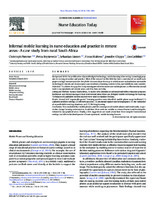| dc.contributor.author | Pimmer, Christoph | |
| dc.contributor.author | Brysiewicz, Petra | |
| dc.contributor.author | Linxen, Sebastian | |
| dc.contributor.author | Walters, Fiona | |
| dc.contributor.author | Chipps, Jennifer | |
| dc.contributor.author | Gröhbiel, Urs | |
| dc.date.accessioned | 2014-10-28T09:46:11Z | |
| dc.date.available | 2014-10-28T09:46:11Z | |
| dc.date.issued | 2014 | |
| dc.identifier.citation | Pimmer C, et al. (2014). Informal mobile learning in nurse education and practice in remote areas-a case study from rural South Africa. Nurse Education Today, 34 (11):1398–1404 | en_US |
| dc.identifier.issn | 0260-6917 | |
| dc.identifier.uri | http://hdl.handle.net/10566/1281 | |
| dc.description.abstract | BACKGROUND: With the proliferation of portable digital technology, mobile learning is becoming increasingly popular in nursing education and practice. Most of the research in this field has been concentrated on small-scale projects in high income countries. Very little is known about the ways in which nurses and midwives use mobile technology in remote and resource poor areas in informal learning contexts in low and middle income countries. OBJECTIVES: To address this gap, this study investigates whether nurses use mobile phones as effective educational tools in marginalized and remote areas, and if so, how and why. SETTING AND METHODS: In rural South Africa, 16 nurses who attended an advanced midwifery education program, facilitators and clinical managers were interviewed about their use of digital mobile technology for learning. Techniques of qualitative content analysis were used to examine the data. RESULTS: Several rich “organically-grown”, learning practices were identified: mobile phone usage facilitated (1) authentic problem solving; (2) reflective practice; (3) emotional support and belongingness; (4) the realization of unpredictable teaching situations; and (5) life-long learning. CONCLUSIONS: It is concluded that mobile phones, and the convergence of mobile phones and social media, in particular, change learning environments. In addition, these tools are suitable to connect learners and learning distributed in marginalized areas. Finally, a few suggestions are made about how these insights from informal settings can inform the development of more systematic mobile learning formats. | en_US |
| dc.language.iso | en | en_US |
| dc.publisher | Elsevier | en_US |
| dc.rights | This is the author's post-print version of an article published by Elsevier. | |
| dc.source.uri | http://dx.doi.org/10.1016/j.nedt.2014.03.013 | |
| dc.subject | Tele-education | en_US |
| dc.subject | Rural health | en_US |
| dc.subject | Mobile learning | en_US |
| dc.subject | Ubiquitous learning | en_US |
| dc.subject | Emerging technologies | en_US |
| dc.subject | Nursing education | en_US |
| dc.subject | Distance education | en_US |
| dc.subject | e-Pedagogy | |
| dc.title | Informal mobile learning in nurse education and practice in remote areas-a case study from rural South Africa | en_US |
| dc.type | Article | en_US |
| dc.privacy.showsubmitter | false | |
| dc.status.ispeerreviewed | true | |
| dc.description.accreditation | Web of Science | en_US |

